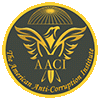Friday, August 19, 2016
Thursday, August 18, 2016
Organizations Anti-Corruption Certification Program
Starting September 1,
2016, The AACI offers globally a disciplined anti-corruption certification
program to organizations seeking to prevent fraud and corruption inside their
business processes, operations, and culture. This certification process is the first
of its kind worldwide and forms a basis for institutional change in fighting
fraud and corruption. It is available to organizations of all kinds and types.
The process is principally administered and completed Online.
It is
an annual certification process that shows quantitatively the
collective anti-corruption knowledge score of those who are charged with
governance and reports on the result.
Read more
Read more
Swiss Private Bank Linked to Malaysia Scandal

L. Burke Files, President of The AACI, is quoted in the New York Post.
"New cracks appeared earlier this month. L. Burke Files, who heads up a private anti-fraud agency, raised questions about a Cayman fund for 1MDB, the Bridge Global Absolute Return Fund.
“It was less than a month old when billions were deposited in into its accounts,” he told The Post. “The issue is that when the funds were deposited, the company had been formed, but it was not yet registered and licensed as a fund.”
Monday, August 1, 2016
Fighting Corruption in Developing Countries: Illusions and Realities
By: Mike J. Masoud, CPA, CACM, CFE, MBA
Technical Advisory Director, Middle East and Africa
The American Anti-Corruption Institute (AACI)
Developed and developing countries are presumably on the defensive line in fighting fraud and corruption. Pressures are mounting on every country to do its utmost to deal effectively with the cancer of globalization: corruption. On May 12, 2016, at The Anti-Corruption Summit in London Secretary Kerry stated “We are fighting a battle, all of us, for our states, for our countries, for our nation-state. Corruption writ large is as much of an enemy, because it destroys nation-states, as some of the extremists we’re fighting or some of the other challenges that we have faced.” This is the ever strongest message of the U.S. regarding fighting corruption. Our interpretation of this message is straightforward: a country that does not show serious efforts to fight corruption works against the international efforts of the U.S. to eradicate corruption and, at the minimum, indirectly supports extremists and terrorism.
However, developing countries face real challenges in dealing with this complex socio-economic phenomenon amid the successive waves of globalization and information technology evolution and revolution. The severity of these challenges stems from the fact that in too many developing countries, the state / government is not accountable to its citizens. The state controls and runs its public resources (wealth) with the lowest levels of transparency to manage corruptly its people and opposition political parties ( if any). Too many developing countries govern by managing the fear of their citizens, engineering and institutionalizing nepotism, creating and maintaining their dynasties, and ruining the social values of their societies. To make it worse, even when such countries introduce certain levels of democratic practices or what they call “reforms”, their citizens are usually skeptical about the underlying motives and planned objectives. There is no “access to information, citizen engagement, and fiscal transparency”. Corrupt governing practices usually tend to escalate in the natural resources rich countries. “Is it any wonder then that, in time, corruption becomes ingrained in the culture.” Ed Fuller stated recently in Forbes.
“Yet there has been much less discussion about the key institutional change needed to bring societies to the point where they are capable of controlling corruption and achieving good governance.” Unfortunately, many developing countries, especially Arab countries driven by the ramifications of the “Arab Spring”, reacted primitively in addressing corruption. All of a sudden, most Arab countries asserted the existence of corruption in their home countries and started to assure their public they will not tolerate corruption anymore! Some Arab countries established national anti-corruption commissions while others rushed to ratify the United Nations Conventions Against Corruption. As there are no national independently published surveys measuring the national levels of corruption, there are substantial doubts about the success the national anti-corruption commissions or all kinds of anti-corruption reforms. Developing countries rely on international agencies to opine on their levels of corruption. For example, when Transparency International issues its annual corruption perception index, these countries celebrate any improvement they achieve when they score better than other countries or their earlier score(s). What these countries should celebrate is their achievement in lowering the levels of unemployment, poverty, and income inequality, They should also celebrate the increased level of public engagement and civic society in monitoring the performance of their governments and public officials, These countries are gifted with talented youth generations that must be engaged in fighting corruption.
Corruption in developing countries and its consequences are realities representing threats to the national, regional, and international security. Yet, the ultimate beneficiaries of corruption exist within the national state borders and beyond. Panama Papers support this assertion. The international community is sometimes passively corrupt when it endorses corrupt developing countries. Undoubtedly, this hypocrisy encourages systemic corruption in developing countries. The international community has legal and ethical obligations to expose corrupt countries and take real effective measures to put these countries on alert. There are recently voices that require having an International Anti-Corruption Court (IACC). Though this is hard to sell, we do not encourage establishing the IACC.
Fighting corruption in developing countries should always be based on and supported by the local national efforts. Unchecked local power is the number one cause of corruption. Developing countries are expected to show more than political will to fight corruption: they should show results.
© All Rights Reserved.2016. The American Anti-Corruption Institute (AACI)
Further readings: America’s Global Corruption Crusade
Further readings: America’s Global Corruption Crusade
Subscribe to:
Posts (Atom)




